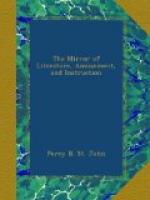inducted into the parsonage of Bemerton, a mile from
Salisbury; the third day after which, he said to his
wife, “You are now a minister’s wife,
and must now so far forget your father’s house,
as not to claim a precedence of any one of your parishioners;
for you are to know that a priest’s wife can
challenge no precedence or place, but that which she
purchases by her obliging humility; and I am sure,
places so purchased do best become them. And
let me tell you, that I am so good a herald, as to
assure you that this is truth.” These rules
his meek wife observed with cheerful willingness.
Herbert now set about his “Priest to the Temple:
or the Country Parson, his character, and rule of
Holy Life.” Unlike many doctrinists, he
practised his own rules: he was a self-example
of his own precepts, and his book was the rule of
his own life; or, as Walton more beautifully explains
it “his behaviour towards God and man may be
said to be a practical comment on the holy rules set
down in that useful book.” Thus, he sets
forth the Diversities of a Pastor’s life:
the Parson’s life, knowledge, praying, preaching,
Sundays, house, courtesy, charity, church, comfort,
eye, mirth, &c.; his prayers before and after Sermon,
with a few poetical pieces of quaint but touching
sweetness. His poetry has been censured for its
point and antithesis; but he cultivated the poetical
art to convey moral and devotional sentiments; others
excel him in smoothness of versification, but not
in benevolent purpose. Herbert though himself
a pattern of humility, was younger brother of the
celebrated Lord Herbert of Cherbury, whom Horace Walpole
abuses for his beauty and gallant bearing, tinctured
it must be allowed, with affected notions of high birth.
But the gay philosopher of Cherbury lived in the last
days of chivalry, and had their light but gleamed
upon Walpole, he would, in all probability, have borne
the very qualities which he so loudly censures in Herbert.
The pastor Herbert’s wife was nearly related
to Lord Danby, so that the caution which we have quoted
was perhaps requisite. As Herbert sank his own
high birth, it was but fit that his wife should forget
hers also.
* * * * *
THE NEW BATH GUIDE.
What a change from grave to gay—from the moral antitheses of Herbert’s Country Parson to the fun and folly of Anstey’s New Bath Guide, with etchings by George Cruikshank, and cuts admirably designed and engraved by S. Williams—as Mr. Simkin dressing for the ball:
But what with my Nivernois hat can compare,
Bag-wig and laced ruffles, and black solitaire,
And what can a man of true fashion denote,
Like an ell of good riband tyed under
the throat.




